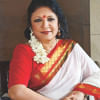The Cry We've Got to Hear
At the recent launch of her newest audio CD, Gane Gane Nazrul Jeeboni, after seeing some foreign nationals in the audience, singer and writer Nashid Kamal displayed her usual kindness by saying that she would introduce each song in English for the benefit of 'non Bengali-speaking' guests. Yes, just like that, she didn't use the word 'foreigners'. Nashid's simple strategy for inclusiveness worked well: I instantly felt like a part of the local people, and the informal, extended family of staunch admirers of the great national Poet Nazrul Islam.
Feeling like an adopted son of this country: it can happen only if you subscribe to the peculiarly re-drawn maps of the Italian artist Nicola Strippoli, better known in the art world as Tarshito. An act of pure will and you will find the Bangladeshi Delta bordering Italy, turning my country into the boot of the eastern part of the Indian subcontinent, or any other country in the East or West. This speaks volumes about the wonders of the geography of emotions. It is little wonder then if we, too – the adopted sons of Bangladesh – feel the impact of any adverse event or trend on the country's social and cultural fabric. Most of you are familiar with the subject and characters of Syed Waliullah's novel Cry, River, Cry (Kando Nadi Kando). The cry of a dying river that is first heard by a young female teacher finally comes to be heard by all the inhabitants of the small town of Kumurdanga. In today's Bangladesh, the cry that all of us are hearing, even more clearly now that the number of tragic events are increasing almost weekly, does not come only from the dying canals or "The Black Gel" once known as the Buriganga River: it comes from people who have been attacked and hacked to death or who see themselves as potential future victims for professing ideas or creeds that are different from those of self-appointed guardians of religious orthodoxy and social customs. The cry of the expatriates' community over the murder of Cesare Tavella and Hoshi Kunio and the cry of local society as a whole over the repeated, incessant attacks on bloggers, intellectuals, religious minorities and even ordinary people - have they really been heard by the authorities? We would like to see more resolve from their side, for what is at stake is the very future of the much-cherished secular features of the State and the rich cultural diversity of this country.
To our Bangladeshi friends I would say: please, don't look at our preoccupation - the concern of Italy, the European Union and many other countries here represented - as the unwelcome interference of a handful of foreign envoys on Bangladesh' domestic affairs! Let's instead join hands in fighting the evil of the day: a ruthless, faceless terrorism acting in the name of religion. Only by doing so can we help to make the world in general and Bangladesh in particular a better place to live in, and revert from the sad exclamation we began to utter recently, 'Cry, Bangla, Cry' (Kando Bangla Kando), to the ever-inspiring and prideful 'Joy, Bangla, Joy!'
The writer is Ambassador of Italy to Bangladesh. This is a reproduction of his speech on June 2 on the occasion of Italy's National Day.

 For all latest news, follow The Daily Star's Google News channel.
For all latest news, follow The Daily Star's Google News channel. 







Comments